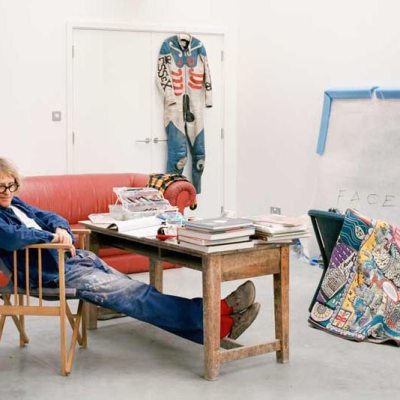This evening, Grayson Perry will receive the 25th Critics’ Circle Annual Award for Distinguished Services to the Arts in Britain. He is the first visual artist to be honoured with this award, granted annually by the Circle founded to promote and uphold criticism in 1913.
Perry is probably getting used to being the first visual artist. First potter to win the Turner Prize. First artist to give the Reith Lectures. And in December 2013, also the first to be named the Apollo Personality of the Year.
I visited Perry in his studio in Islington in November 2013 to profile him for that award. We republish an extract of the interview here to mark this evening’s accolade:
The Reith Lectures, the last of which is yet to be broadcast when we meet, have been greeted with widespread critical approval for their pith and plain-spokenness. As Perry made clear in the opening salvo of his first lecture, the series’ title, Playing to the Gallery, is a riposte to the idea of ‘sucking up to an academic elite’. Did he hesitate when he was invited to give them? ‘The people that I was concerned about were probably your readership! I could feel them breathing down my neck and had my normal imposter syndrome…But I thought they’ve asked me, so they want me to be as much me as I can be. And so I delivered the Grayson Perry Reith Lectures; I didn’t deliver something academic.’
The lectures have an admirable clarity – the word is something of a mantra for Perry – as they shade in the Venn diagrams by which we constitute taste and artistic value today. Yes, they take on the mystifications of the art world: at once teasing its foibles from an insider’s perspective, and teasing them out for the more general listener (‘they’re a sort of concentrated magic bullet that’s going into the houses where you really want to go’). But they don’t sound like an attack on the art world so much as a provocative defence of it. ‘People outside the art world,’ says Perry, ‘often want art to be instantly gratifying, and I say “No, it’s not going to happen like that.” You can’t walk into an art gallery and expect to know and understand and appreciate it all on the first visit. Art history is a long conversation and you’ve got to get involved in that. I worry sometimes about a popularising agenda and making art more entertaining. I don’t do it – I don’t! – I just happen to have a schtick that’s entertaining.’
Words and wit have always been close cousins in Perry’s work; and if they do indeed contribute to its accessibility, then that accessibility has always admitted nuance and often controversy. ‘Contemporary art demands a voice’, he told Wendy Jones in the biographical Portrait of the Artist as a Young Girl (2006), a statement that in his case might refer not only to creative individualism, but to the way so many of his own pots write their own scripts. They incorporate captions, slogans, ironic mottoes and speech bubbles that provide a complex gloss on the objects themselves and what their surfaces illustrate. Look Mum, I’m a Jet Pilot (2000; Fig. 2) imposes Boy’s Own images of fighter planes over what look like little brick courses of text, vacillating between messages of love and hate. Video Installation (1999), a pot that the writer Howard Jacobson likened to Duchamp’s urinal, lists some of the loony shibboleths of contemporary art across its modest, gourd-like belly.
‘I can remember early shows where every pot would have a screed of quite pretentious stuff on it,’ Perry says. ‘But people feel obliged to read. They would walk round the gallery and feel they had to read the pots.’ In his second Reith Lecture, Perry paraphrased the philosopher George Dickey, remarking that an artwork might be ‘a candidate for contemplation or appreciation’. The idea ties in with what is, for me, the overarching investigation made by his strongest work, whatever its ostensible subject: our society’s troubled attention span, and the related question of whether art might focus or further disrupt it. ‘What worries me now,’ he tells me, ‘is that the internet makes everything so instant that nothing has time to germinate any more. Nothing gently evolves.’
Related Articles:
National Treasure? Grayson Perry and the Reith Lectures (James Cahill)



